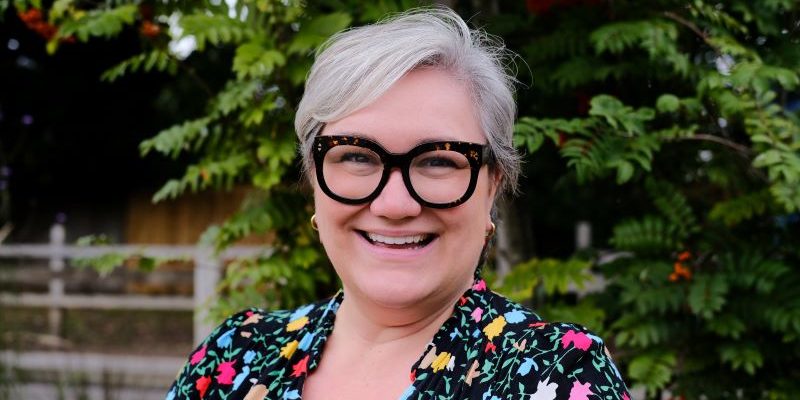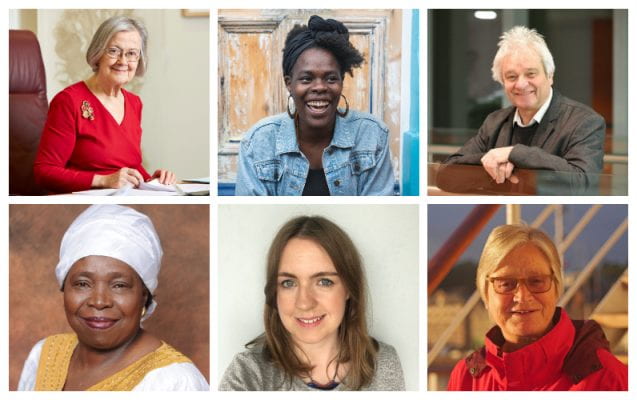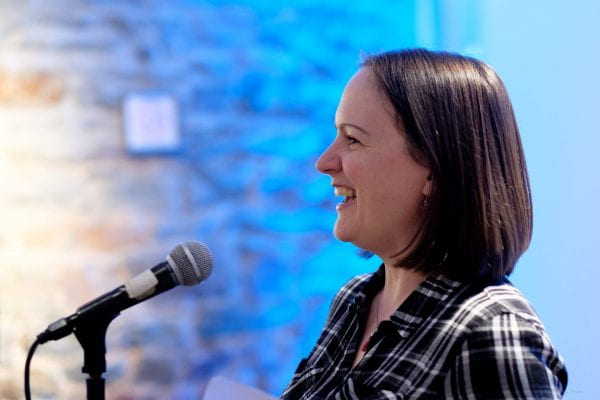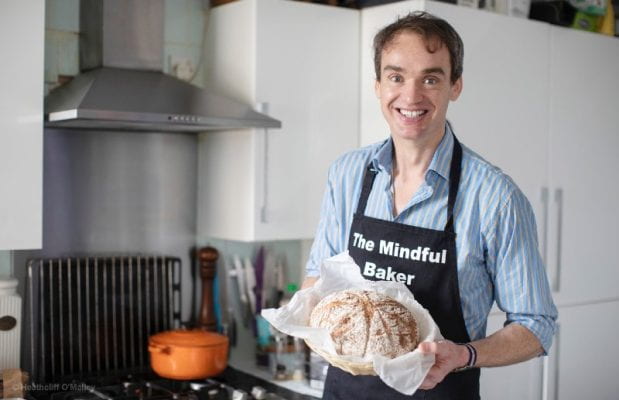
A buzzing sense of pride and laughter filled the Orangery at Goldney House last weekend as the 2025 Alumni Award winners came together to celebrate their achievements.
For the latest updates from your alumni community

A buzzing sense of pride and laughter filled the Orangery at Goldney House last weekend as the 2025 Alumni Award winners came together to celebrate their achievements.

Kathryn Moore (BA 2005) has fond memories of sitting in the quad at Wills Hall in the summer sunshine, with her fellow students of English at the end of term. While everyone else was busy with exams, Kathryn and her classmates could enjoy some freedom as the university year ended because at that time, English students were continually assessed throughout the year, rather than having an intense period of exams at the end. Like many of our alumni, Kathryn is still in close contact with the friends she met while studying, and is a regular visitor back to the city.
‘Studying at Bristol was such a happy time in my life. I picked a subject I really enjoyed and met like-minded people wherever I went – on my course, in halls and in the various societies.’ (more…)

From final-year medics graduating early to work on the NHS frontline, to groups organising foodbank donations, throughout this year Bristol students have been stepping up to assist those impacted by the pandemic. Many of our final-year students have been taking part in such activities, all whilst working hard to complete their degrees.
For these students, their time at the University is almost at an end. So, to mark their incredible achievements and commemorate their final year, the University is hosting a series of virtual celebrations for the class of 2020. The events will be hosted online and will see Bristol students from all over the world signing in from home to watch with their friends and family.
Every year, just after welcome week, the University hosts a welcome event for our Sanctuary Scholars, an incredible group of students who all come from asylum-seeking or refugee communities.
The welcome event is always a really special day, where the newest cohort of scholars get to meet each other, as well as staff and students from the University.
This year, as you can imagine, we can’t welcome our scholars in quite the same way. But whilst we might not be able to be together in one room, we can still do our very best to let these students know that they are a valued part of the Bristol community. We hope you’ll join us in doing so!

Jane Duffus (MA 2010) is on a mission to celebrate the incredible women who have made Bristol brilliant. The first book in her The Women Who Built Bristol series was published in 2018 and includes the stories of 250 inspiring women from Bristol’s history. From a heartbroken barmaid from Easton, to an abducted heiress – each story tells the tale of a vibrant woman who changed the city of Bristol in her own unique way.
After the success of her first book, Jane went on to publish The Women Who Built Bristol: Volume Two and she’s now hard at work writing Volume 3. We caught up with her to find out more about her time at the University and her writing process.
 Visit a supermarket during lockdown and the empty shelves which once stocked flour, yeast and eggs give an indication of the nation’s newest obsession: baking. Whether out of necessity or curiosity, people up and down the country are trying their hand at creating their own loaves – with varying levels of success.
Visit a supermarket during lockdown and the empty shelves which once stocked flour, yeast and eggs give an indication of the nation’s newest obsession: baking. Whether out of necessity or curiosity, people up and down the country are trying their hand at creating their own loaves – with varying levels of success.
But could this new hobby bring other benefits? Could it even increase our ability to live mindfully? For Bristol alumnus, Tim Leach (LLB 2006), the two go hand in hand. Also known as the Mindful Baker, when not in lockdown Tim teaches breadmaking workshops through which he explains the principles of mindfulness.
However, Tim wasn’t always a baker. As a law student at the University of Bristol and a resident of Wills Hall, he was on track for a legal career in the city. But his path altered courses drastically, after he suffered a life-threatening accident on a post-graduation ski holiday.
After skiing off the side of a mountain, Tim broke his back and neck and had to be induced into a three-week coma. He sustained significant head injuries, which have impacted his memory ever since.
Forced to spend years focusing on his recovery, Tim felt like he was being left behind by his peers.
“My friends were all doing well in their jobs, getting promotions and some of them were starting to get married,” says Tim. “I could have really hit the ‘feel sorry for me’ button, but it wouldn’t have got me anywhere and most likely it would have sent me into a depression. I made a conscious decision to work my way out of the situation I was in.”
Tim set up his own shirt-selling businesses, which he ran for a number of years. But his true turning point came when he discovered mindfulness in the most unlikely of places: on a day long course which promised to improve attendees’ success in the dating world.
“We got to the last session of the day,” says Tim, “and the man running it started by saying: ‘You’ll never find the person you want to be with or find inner peace until you learn to love yourself.’ I couldn’t help feeling a bit sceptical. But then he asked us to shut our eyes and breathe deeply in and out and all of a sudden, I was completely engrossed. He led us though a guided meditation which was something I’d never done before. I found it pretty incredible.”
“He gave us his email address and told us to write to him every week to let him know how we were finding meditation – just as an incentive for us to keep going. He said that statistically only one per cent of us would actually do that, but that he wanted us all to be one per cent-ers.”
Tim kept his meditation up and a couple of months later he was still faithfully emailing the course instructor once a week.
“After a while we met up for a really nice lunch,” says Tim. “He was so lovely and was genuinely interested in how I was getting on with meditation. At the end of the meal I asked him how many people from the course were still emailing him and he said: ‘You’re the only one. You were the one per cent!’ Hearing that just made me think – I can really do this. I can keep this mindfulness going and learn even more about it.”
Tim went on several courses to expand his knowledge of mindfulness and the practice became an intrinsic part of his life.
“The baking side of things came into it all a few years ago,” says Tim. “I had a party and my cousin’s husband arrived with a couple of homemade loaves of sourdough. It was such a great gift and I asked if he could show me how to make them too.”
“He came round and taught me how to make this bread and I was amazed by the simplicity of it all,” says Tim. “Sourdough is made with a starter, a kind of fermented dough, that you have to look after and ‘feed’ every week with flour and water. I could see how it related to being mindful and looking after yourself. I realised that having a tangible thing to work with like bread would be a really good way to explain mindfulness to people and demonstrate different techniques.”
Tim set to work creating a course which would teach participants how to make delicious bread, as well as giving them a grounding in mindfulness.
“When you make sourdough you put the starter in first and then flour and water,” says Tim, “and the whole thing turns into a massive, muddy mess. It’s similar to the state we can get ourselves into when we’re trying to deal with problems. On my course I get people to create that mess, and then we go into the other room to talk about mindfulness techniques such as breathing and visualisation exercises.”
“During that time the starter, flour and water mixture will be developing and forming gluten bonds. It demonstrates how you can use mindfulness when you’re faced with a problem. By simply observing it and acknowledging it, rather than trying to solve everything or change things we can’t change, often things will come together all on their own.”
Usually, Tim’s courses are delivered to around five people at a time at his home in Battersea. But with lockdown keeping us all indoors, he’s adapted by creating his own Youtube channel, full of baking tutorials. He’ll soon be uploading videos which go through various mindfulness techniques, which he hopes will provide comfort for people in lockdown.
“Learning how to observe and let things be can really help people to cope with the current situation,” says Tim. “For those of us isolating at home, there’s absolutely nothing more we can do other than keeping ourselves out of harm’s way and following the social distancing guidelines. Apart from that, all we can do is accept the situation that we’re in and allow it to be the way it is.”
Tim also suggests that keeping a list of daily achievements, no matter how small, can help during this turbulent time.
“It’s good to be able to compliment yourself,” he says. “Being kind to yourself or even being kind to a stranger can help you to live in the moment and appreciate the people around you.”
For all those now baking at home, Tim hopes their foray into the world of breadmaking has a lasting impact: “I’d like to think that they are finding the peace and the meditative state that can come about through the process of baking,” he says. “At the end of the day, there’s nothing quite like homemade bread.”
To learn more about Tim’s courses, head to www.themindfulbaker.com
Co-founded by Malaysian-born Ai Ching Goh (BSc 2008), Piktochart is a visual communication tool that allows users to create infographics, posters and more – without the need for design experience.
Ai Ching Goh launched the start-up alongside her partner, Andrea Zaggia, a few years after graduating from the University of Bristol with a degree in Experimental Psychology. Since then the business has seen tremendous growth and is now used by more than 20 million people worldwide.
Last month, Ai Ching Goh was recognised for her achievements when she won the entrepreneurial category of the prestigious 2020 British Council Alumni Awards. Here she talks about her time in Bristol and her path to entrepreneurial success.
Congratulations on your recent award! How did it feel to be recognised for your entrepreneurial achievements?
Very unexpected. So grateful! I never thought that my journey as a student at Bristol would have led to this.
You co-founded Piktochart with your partner, how did you come up with the idea for your business?
Ten years ago, it was the golden age of click through rates – meaning adverts at that time received a far higher number of clicks per view than they do now. As time went on it was becoming increasingly apparent that companies would have to ‘pull’ their customers to them through interesting and valuable content. We predicted that this trend was only going to get more visual, which is why we started focusing on infographics. They really help to communicate complex information that otherwise would not be as easily understood. That’s how we got started with Piktochart!
We believe that effective, great communication is essential to every business. Every role (not just the CEO, HR or PR person) needs to be really good at it. It helps the company to represent itself in a very clear way to its customers and stakeholders and expand efficiently by being one single cohesive unit.
You’re passionate about creating a positive working culture at Piktochart. Can you tell us a bit more about why this is so important to you?
The first company I joined after graduating was a big corporate. I arrived bright eyed and bushy tailed – ready to take on the world. I was sure I was going to make a great impact. But instead, I learnt a series of lessons that would forever change my point of view about ‘work’.
I was hired as an Associate Media Manager, managing a $14M portfolio of radio, TV, magazine and newspaper expenditure and often networking with the celebrities of Malaysia. It was a glamorous job, but I encountered difficulties in the workplace. I became quieter and more lacking in confidence until I withdrew into my tortoise shell. I had a lot of ideas, but I worried so much about whether I sounded stupid that I just stopped asking, stopped doing and tried to guess what was wanted from me.
I was so affected that every weekend, come Sunday, I would start crying because on Monday I had to go to work. I was only in my 20s but I was so burnt out and stressed that eventually my physical health took a toll and I was hospitalised. It took me three months of resting to get better. I spent my days with my iPad, reading about life and thinking about what kind of future I wanted for myself. The biggest thing I learned was that I couldn’t work in an environment like that again.
When it comes to the workplace, you’ve got to get the people and culture right. You can build a successful and enduring corporate business, but if the employees are crying on their Sundays, it’s not a business that I want to be part of.

How do you find balance outside of your working life? What do you do to wind down?
I spend time with my daughter and at the moment there’s very little winding down! My daughter, who is almost three, is a ball of energy. Her nicknames are ‘tornado’ and ‘earthquake’. So as you can imagine, I usually feel like I’m working harder over the weekends – but no complaints! She’s been one of the best things that has happened to my husband and myself. We love cooking, going to the parks, exploring and trying new things, reading the bible, singing.
What kind of student were you?
I was outgoing, took on multiple part time roles, I didn’t do very well in my studies during the first and second years but caught up in the final year. I spent a lot of my time in AIESEC, mingling with the Europeans, and checked out a lot of bars when I was there.
Where was your favourite place to spend time in Bristol and why?
Clifton Hill. I had multiple favourite places but I think this one would top it all. It’s such a pretty place to go for a walk, especially because of its quaint little shops. I also loved the farmers’ market, whenever they had one on!
How did studying at the University impact you as a person?
It made me think more critically which came in handy for writing essays etc. Apart from that, it constantly forced me out of my comfort zone. I took on multiple roles in AIESEC, travelled for conferences and built some of my most enduring friendships. I also was part of the Telethon team at the Development and Alumni Relations Office (DARO). I had to survive not being at home for more than three years, but all of it really shaped me to be someone who dared to take chances.
What advice would you give to Bristol students who might be hoping to start their own businesses?
I think that work experience is important. However, if you’ve been entrepreneurial throughout your life, then find a way to quickly validate your ideas and fail fast. The path of an entrepreneur is filled with failures and you would be wise to find ways to “shortcut” it, for example by learning from books, by getting a mentor, by building prototypes and not being afraid to fail.
For many of us, choosing what we want to be when we ‘grow up’ can be a life-long mission, but not for Bristol alumnus, Sam Rowley (Bsc Biology 2016). Since the age of ten he’s known exactly what he wants to do: travel the globe capturing some of the world’s most beautiful animals on film.
Now, Sam works for the BBC’s Natural History Unit and since graduation he’s photographed and filmed animals in countries such as Ethiopia, Madagascar and India. But his most recent achievement took place much closer to home, when Sam won the Wildlife Photographer of the Year: Lumix People’s Choice Award for his depiction of mice fighting on a London tube station platform.
We caught up with him to chat about his recent win, Bristol wildlife and top tips for aspiring photographers.